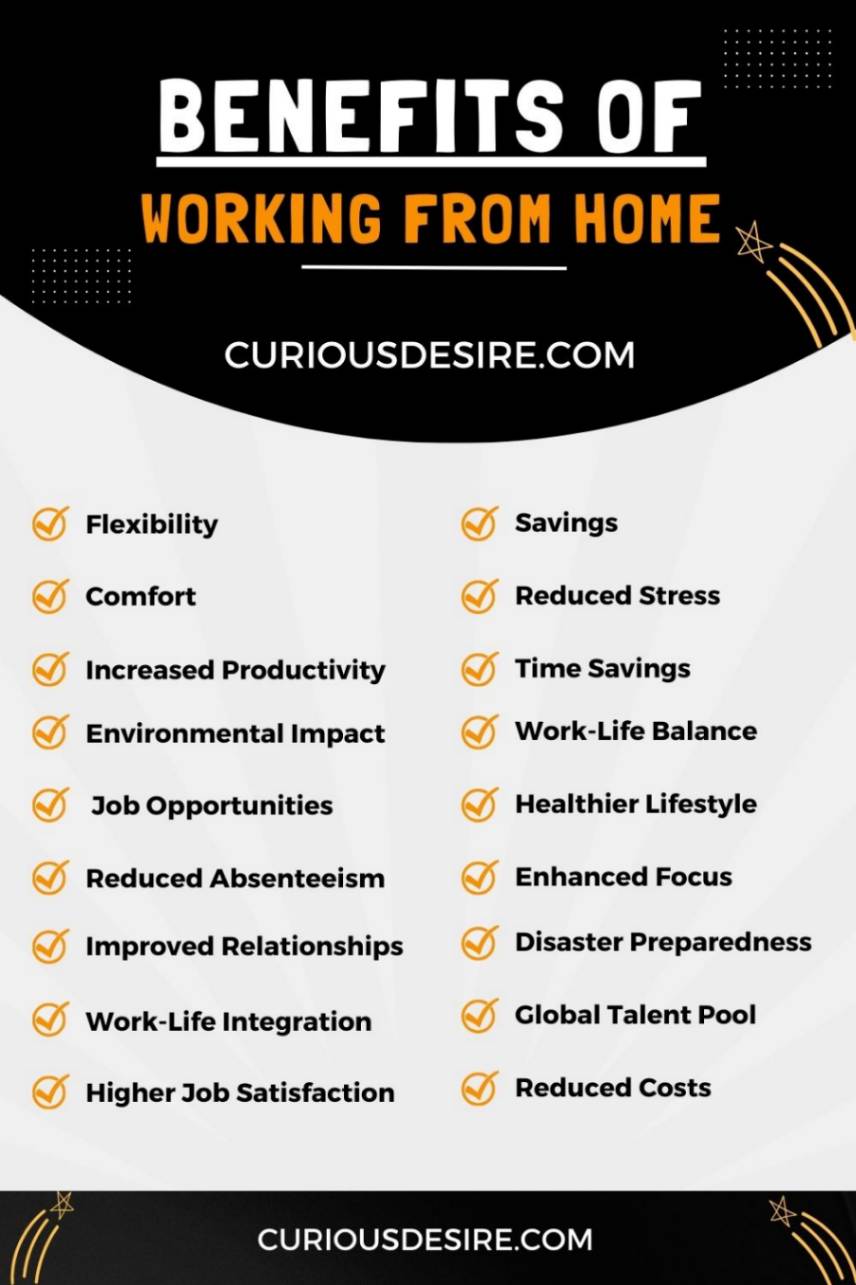Here are the 5 common benefits of working from home:
- Flexibility
- Increased Productivity
- Time Savings
- Work-Life Balance
- Healthier Lifestyle
1. Flexibility
Flexibility is beneficial because it allows people to choose when and where they work. This means they can adjust their schedules to fit their personal lives better.
For example, parents can take care of their children while still getting work done, or people can avoid rush hour traffic by working during off-peak times. This flexibility leads to positive outcomes like reduced stress and increased job satisfaction.
When people have control over their work schedules, they can better balance their work and personal responsibilities, leading to happier and more motivated employees.
Additionally, flexible work arrangements can attract a wider range of talent to companies, as individuals with diverse needs and preferences can find options that suit them.
Overall, flexibility in work arrangements benefits both employees and employers by promoting better work-life balance and overall well-being.
2. Savings
Remote work offers substantial financial savings for employees as it eliminates the need for daily commuting expenses such as gas, public transportation fares, and parking fees.
This means that individuals can retain more of their hard-earned money, allowing for better budgeting and financial stability.
For example, not having to spend on transportation can free up funds that can be allocated towards other essential expenses like groceries, utility bills, or savings for future goals.
These savings not only provide immediate relief but also contribute to a sense of financial security and well-being among remote workers, allowing them to better plan for their financial future.
3. Enhanced Comfort
Working from home provides individuals with the opportunity to create a comfortable and personalized workspace tailored to their preferences.
This can include investing in ergonomic chairs, adjustable desks, or simply being able to work in attire that promotes relaxation, such as loungewear.
By working in a space that promotes comfort and relaxation, employees can alleviate physical discomfort and increase overall satisfaction with their work environment.
For example, having the freedom to work from a cozy corner of the living room or a favorite coffee shop can enhance comfort and enjoyment while working, leading to higher productivity and job satisfaction.
Additionally, remote workers can personalize their workspace with items that bring them joy, such as photos, plants, or favorite decorations, further enhancing their sense of comfort and well-being throughout the workday.
4. Reduced Stress
Remote work often leads to reduced stress levels compared to traditional office environments.
Without the daily commute and office-related stressors, such as noisy coworkers or strict schedules, individuals can experience a greater sense of calm and relaxation while working from home.
For instance, being able to take short breaks to walk the dog or enjoy a leisurely lunch can help alleviate stress and increase overall happiness throughout the workday.
Additionally, remote work allows for greater autonomy and flexibility in managing tasks and deadlines, reducing the pressure associated with rigid work schedules.
As a result, remote workers can maintain a healthier work-life balance and feel more fulfilled in their roles, leading to long-term benefits for both individuals and organizations.
5. Boosting Productivity
Remote work often leads to increased productivity as employees can focus without the distractions commonly found in traditional office settings.
For example, without interruptions from coworkers or unnecessary meetings, individuals can dedicate uninterrupted time to completing tasks efficiently.
This heightened focus allows for greater output and better time management.
Moreover, the flexibility of remote work empowers employees to choose their most productive hours, whether that’s early in the morning or late at night, resulting in higher-quality work delivered in a shorter timeframe. Benefits include:
- Enhanced focus and concentration
- Efficient time management
- Ability to choose peak productivity hours
- Higher-quality work output
- Reduced time wasted in meetings and distractions.
6. Time Savings
By adopting practices that prioritize flexibility and remote arrangements, individuals can recapture the time typically consumed by commuting to and from the workplace.
This means they can use the time they’d normally spend traveling for things like hobbies, spending time with family, or taking care of personal tasks.
For instance, instead of sitting in traffic or on crowded public transport, employees can use that time to go for a walk, have breakfast with loved ones, or pursue activities they enjoy.
Saving time on commuting allows for a more balanced lifestyle, where people can still get their work done efficiently while having more time for themselves and their families.
This leads to a greater sense of fulfillment and well-being, as individuals can prioritize activities that contribute to their overall happiness and satisfaction.
7. Environmental Impact
Another significant benefit is the positive impact on the environment. Opting for alternative work arrangements helps reduce the environmental impact of daily commuting.
When employees choose to work remotely, there are fewer cars on the road, which means less air pollution and a smaller carbon footprint.
Additionally, remote work reduces the need for office space and resources, further helping the environment by conserving energy and reducing waste.
By embracing practices that cut down on commuting, individuals and companies play a vital role in fighting climate change and keeping the planet healthy for future generations.
This environmental stewardship not only benefits the planet but also contributes to a sense of purpose and responsibility among employees and organizations.
8. Work-Life Balance
Flexible work arrangements make it easier to balance work and personal life. This flexibility allows employees to prioritize their well-being, spend time with family, and pursue personal interests without sacrificing their career goals.
For example, people can adjust their work hours to attend important family events or schedule appointments without feeling stressed. This balance leads to less stress and greater satisfaction with work.
By blending work and personal life in a way that works for them, individuals can lead more fulfilling and sustainable lives.
Achieving this harmony promotes stronger relationships, improved mental health, and a greater sense of fulfillment both at work and at home.
9. Expanded Job Opportunities
Another significant advantage is the increased job opportunities that come with flexible work arrangements.
Talented professionals can now access job opportunities with companies located anywhere globally, no matter where they live.
For instance, someone living in a small town or another country can work for a big company based in a major city without having to move.
Flexible work arrangements remove barriers to employment, promote diversity, and allow companies to hire from a wider pool of talent, leading to more innovation, collaboration, and success in today’s workforce.
This expansion of career horizons not only benefits individuals by providing them with diverse career options but also enriches companies by bringing in fresh perspectives and expertise from different backgrounds and regions.
10. Healthier Lifestyles
Embracing flexible work arrangements contributes to promoting healthier lifestyles among employees. Here’s how
- Increased Physical Activity: Remote work allows for more opportunities to engage in activities like walking or exercising.
- Healthier Eating Habits: Working from home enables better control over food choices, leading to improved nutrition.
- Reduced Stress: Remote work reduces stress levels by eliminating the daily commute and office-related stressors.
- Improved Sleep Quality: Flexible schedules support better sleep patterns, enhancing overall restfulness.
- Enhanced Work-Life Balance: Remote work facilitates a better balance between work and personal life, promoting well-being.
These factors collectively contribute to improved physical, mental, and emotional well-being among employees.
11. Reduced Absenteeism
With working from home, absenteeism decreases as employees have the flexibility to manage their work and personal responsibilities more effectively.
This means that even if they can’t make it to the office due to illness or other commitments, they can still work from home.
For instance, if someone is feeling under the weather but capable of working, they can continue their tasks remotely, ensuring that work doesn’t get disrupted.
This reduction in absenteeism ensures smoother operations and continuity in work, benefiting both employees and employers by maintaining productivity levels and meeting deadlines consistently.
12. Enhanced Focus
One significant benefit of working from home is the enhanced focus it affords individuals.
Without the usual distractions found in traditional office settings, such as interruptions from colleagues or background noise, employees can concentrate better on their tasks.
When working remotely, individuals can create a quiet and personalized workspace conducive to concentration.
For example, they can choose a dedicated area, minimize distractions, and establish a routine that suits their productivity peaks.
This heightened focus allows employees to work more efficiently, accomplish tasks with greater accuracy, and deliver higher-quality outcomes, ultimately contributing to the organization’s success.
13. Personalized Work Environment
Remote work empowers individuals to tailor their work environment to suit their preferences and needs.
This customization allows employees to optimize their workspace for comfort and productivity, leading to increased satisfaction and motivation.
For instance, individuals can select ergonomic furniture, adjust lighting to reduce eye strain, or personalize their workspace with items that inspire creativity.
By having control over their work environment, employees feel more engaged and invested in their work, resulting in improved job satisfaction and overall well-being.
A personalized work environment fosters a sense of ownership and pride, encouraging employees to perform at their best and contribute positively to the organization.
14. Improved Work Relationships
Remote work promotes improved work relationships through deliberate communication and collaboration efforts.
Despite physical distance, technology allows employees to stay connected and build strong bonds with colleagues, supervisors, and clients alike.
For example, video conferencing, instant messaging, and virtual collaboration platforms facilitate regular interactions and teamwork, promoting a sense of camaraderie and trust among team members.
Strong work relationships lead to enhanced collaboration, idea-sharing, and problem-solving, ultimately driving greater innovation and success within the organization.
By nurturing positive work relationships, remote work promotes a supportive and cohesive work environment where individuals feel valued and motivated to achieve shared goals.


